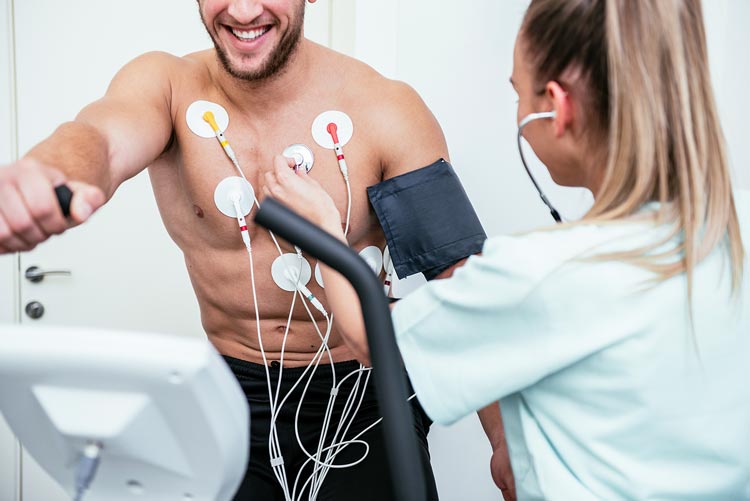If you cannot walk on a treadmill, please call the office and notify us so your appointment can be scheduled accordingly.
Stress Echocardiogram
A Stress Echocardiogram combines a stress test with echocardiographic images of the heart at rest and during peak exercise.
Why Get a Stress Echocardiogram?
- Identify reduced blood flow to the heart muscle (ischemia).
- Evaluate chest pain that may be associated with coronary artery disease (a blockage in the vessels of your heart muscle).
- Determine the effectiveness of a bypass or angioplasty.
- Check the effectiveness of medications: BP, antiarrhythmics.
- Assess exercise/functional capacity.
- Cardiac rehabilitation – entry and exit exam; these are performed to help determine how much exercise you can safely tolerate during Cardiac Rehabilitation.

Available at the Windsor location. Coming to the Essex location in early 2022.
Test Preparation and FAQs
How to Prepare For Your Test
- Bring in a current list of medications.
- Do not wear any creams or lotions.
- Do not wear a Nitro patch on the day of the test.
- Bring water if desired.
- The following Beta Blockers need to be held 24 hours prior to testing: Acebutolol, Metoprolol, Atenolol, Bisoprolol, Carvedilol (Coreg), Lopressor, Pindolol, Nadolol, Propranolol, Verapamil, Cardizem (Diltiazem),
You may be asked to continue these medications.
Should I take my medications on the day of the test?
The following Beta Blockers need to be stopped 24 hours prior to testing: Acebutolol, Metoprolol, Atenolol, Bisoprolol, Carvedilol (Coreg), Lopressor, Pindolol, Nadolol, Propranolol, Verapamil, Cardizem (Diltiazem), Nebivolol (Bystolic)
Can I eat or drink on the day of the test?
- Avoid caffeinated products (cola, Mountain Dew®, chocolate products, coffee or tea) for 3 hours before the test, as caffeine will interfere with the results of the test. Also avoid decaffeinated or caffeine-free products, which contain trace amounts of caffeine.
- DO NOT eat or drink anything except water for four hours before the test.
- DO NOT SMOKE ON THE DAY OF THE TEST, as nicotine will interfere with the results of your test.
What should I wear on the day of the test?
Wear comfortable shoes and clothing.
What happens during the test?
An echocardiogram (ultrasound of the heart) will be performed before the treadmill test so the cardiologist can see your heart at rest. You will be lying on an exam bed on your left side with your left arm up. This portion of the test will take approximately ten minutes. The technician will attach EKG leads to your chest that you will wear throughout the exam.
Prior to the stress test, a cardiologist will review your resting EKG to ensure that it is safe for you to complete the stress test (no abnormalities that were not previously detected).
For the stress part of the test, you will walk on a treadmill. It will start slowly and gradually increase in speed and incline every three minutes. The goal is to reach your target heart rate. The amount of time you walk on the treadmill is different for every patient and depends on your age, ability to exercise, and starting heart rate. You will be asked to exercise very hard and push yourself to get the best possible results. It is normal for your heart rate, blood pressure, breathing, and perspiration to increase.
A registered cardiovascular technologist will be at your side throughout the test to monitor your pulse, blood pressure, and ECG. If there is any change in any of these observations that concern the technologist, they may stop the test immediately. If at any time during the test you feel unwell in any way, tell the technologist.
Once your target heart rate is reached or you develop symptoms such as fatigue, shortness of breath, tired legs, chest pain, or other symptoms, the treadmill will be stopped. You will immediately be asked to lie back down so the technician can take peak exercise pictures of your heart. Because you will suddenly stop exercising, you may feel slightly unsteady or dizzy while quickly getting back onto the exam table.
It is important to move from the treadmill to the bed quickly to obtain the best images while your heart is at or near the target rate.
Your heart rate, ECG, blood pressure and oxygen level will continue to be monitored after exercise until they return to what they were when you arrived.
How will I feel during the test?
Most people experience some fatigue and/or shortness of breath at some point during the test. Your legs may become sore if you are not used to exercising. It is important to let the staff know if you feel any symptoms during the stress test such as shortness of breath or chest pain. The staff will stop the test immediately if any symptoms or unexpected changes in your heart rhythm occur.
How do I get the results of my test?
The cardiologist will review the results of your stress echocardiogram with you before you leave the office on the day of the test. The results will be sent to your family physician, and if different, to the referring physician.

